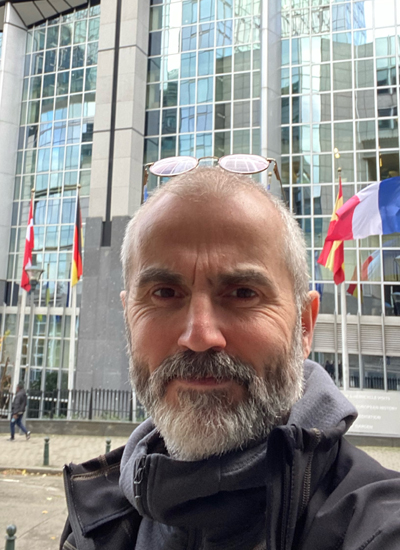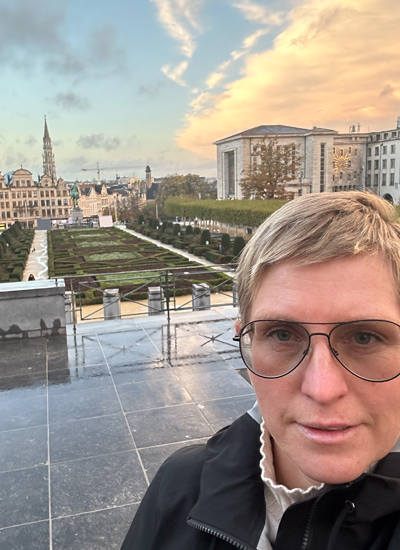Important insights from Brussels visit

The first “EU-course” for the University Alliance Stockholm Trio took place in November, with the university alliance’s Brussels office hosting 18 researchers from the three universities. Six KTH researchers travelled with a research advisor from KTH’s Research Support Office (RSO). Here’s what some of the researchers have to say about their participation.
The EU-course’s aim is for researchers with a greater knowledge and understanding of EU research policies to increase their own commitment and participation at an EU level. This may involve seeking EU funding, taking part in expert groups or being an evaluator, for example.
The Participants met several Swedish representatives during the three-day programme and visited the EU Commission and Stockholm region’s EU offices. They also took part in a workshop at Ghent University.
The course has been well received by the participants, with the possibility of running it again next autumn, already being considered.
Three KTH participants reflect on the EU course:

Martin Edin Grimheden, Head of Department at the Department of Engineering Design, School of Industrial Engineering and Management
What were your expectations of the course?
“I was looking forward to learning more about how the whole system works and what KTH’s and the Stockholm Trio’s strategy is for increasing interest from Brussels. I also wanted to know more about the local presence there, and what cooperation there is between the various organisations there.”
What was the course like?
“It was great. It was a good size, so you managed to get to know most people, and lots of fun to work with people from other universities. Incredibly knowledgeable and experienced people who, among other places, worked at the Stockholm Trio’s Brussels office, as well as those who were invited as speakers, such as from the consulate and other universities.”
What’s your most important takeaway from the course?
“It’s easy to look back in hindsight and think you should have done things differently from the start. However, in my role as a head of department I’ve already started to establish a group of younger researchers with potential. I think that a collective group can grow together within its area, and get more direct support from the department, RSO, Stockholm Trio, as well as get a clear remit to increase the institution’s participation at EU level.”

Hjalmar Brismar, Professor in Biological Physics, Department for Applied Physics, School of Engineering Sciences.
Why did you want to take part?
“For many reasons really but among other things, I wanted to see how we as Stockholm trio can use our strengths in an EU context. I also wanted to acquire more knowledge and inspiration on putting together consortiums and on how to seek and get funding more successfully from EU programmes.”
How was the course?
“Very good, it was stimulating to meet the other participants with their insights from other disciplines and to listen to the lectures. The course provided eye-opening insights on the politics behind the EU Commission’s calls and what’s done to formulate and shape various initiatives and the importance of working to influence forthcoming EU calls. Going forward, it’ll be a new way of thinking.”
What did you learn from the course?
“The most tangible takeaway was the visit to Ghent University where we had a group exercise with their Research Office where we looked at an EU calls and simulated a calls application process. The level of quality and professionalism was impressively high. I had a very rewarding discussion about political instruments that affect how you should formulate a project. I also learnt about a new way of reading calls and what I should look out for in the text.”

Agnieszka Zalejska–Jonsson, associate professor at the Department of Real Estate and Construction Management, School of Architecture and the Built Environment
Why did you want to take part?
“I wanted to gain a better understanding of EU issues and how I can be more active internationally. I am also curious and interested in Horisont Europa, to find out what their funding possibilities are and to gain a better understanding of their work.
What was the course like?
“It was three very intense days. But also eye-opening about how you can work more strategically and the importance of widening research areas. The preparatory workshop at RSO and the meetings with Stockholm trio have also been very rewarding and interesting.”
What’s the most important thing you learnt from the course?
“Among other things that one can be a more active link on a strategic level, both when you work between different universities and even within one’s own research at KTH. And how important it is to understand international strategies and how they impact us, as well as to understand how we can take part in those decisions and be more active. It’s important we stretch ourselves beyond our comfort zone to contribute with different perspectives between different disciplines and to build necessary bridges.”
Text: Annelie Englund

